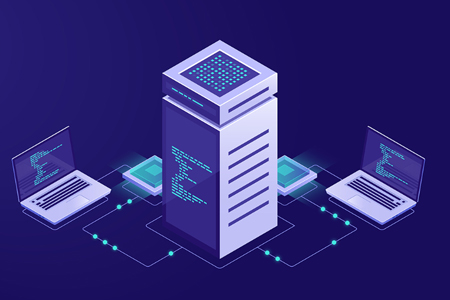Cloud hosts and physical servers have their own advantages and applicable scenarios. Which one to choose depends on your needs and specific situations. This article will explore the characteristics, advantages, and disadvantages of cloud hosting and physical servers, and how to make choices according to different needs.
The characteristics and advantages of the cloud host
1.1 What is a cloud host?
Cloud hosting is a virtual server instance created by virtualization technology on cloud computing infrastructure. These virtual machines can dynamically create, expand and manage the infrastructure of cloud service providers. The following are some characteristics and advantages of cloud hosting:
1.2 Flexibility and retractability
Cloud host allows users to dynamically create, expand or reduce virtual server instances according to demand, without having to purchase new physical servers. This flexibility and retractability make cloud hosts apply to workloads and needs.
1.3 Resource sharing
Cloud host is a virtual machine in the multi -tenant environment, and multiple virtual machines can share hardware resources on the same physical server. This sharing model can make the cost lower because hardware resources are fully utilized.
1.4 Automation Management
Cloud service providers usually provide automated management tools, such as automatic backup, monitoring, automatic expansion and load balancing. These tools simplify server management tasks and reduce the burden on maintenance.
1.5 Billing on demand
Cloud hosts are usually provided as required. Users only need to pay for the actual resource used, and there is no need to purchase or rent hardware equipment in advance. This model can reduce initial costs.
1.6 Global usability
Cloud hosts can be provided globally. Users can choose to deploy their virtual machine instances at the data center closest to their users to reduce delay and improve performance.
The characteristics and advantages of physical server
2.1 What is a physical server?
Physical server refers to a separate server based on physical hardware. Each physical server has its own hardware resources, including CPUs, memory, storage and network interfaces. The following are some characteristics and advantages of physical server:
2.2 Independence
Physical server is an independent server instance and does not share hardware resources with other servers. This means that users have exclusive control of the entire server and can be customized according to their own needs.
2.3 High performance
Because physical servers do not share hardware resources, they usually provide higher performance. This is essential for applications that require a large number of computing or storage dense tasks.
2.4 Security
The independence of the physical server also enhances security, because users can fully control the access of the server and security settings. This is very important for applications with high requirements for sensitive data or compliance.
2.5 Controlled hardware
Users can select the server's hardware components, such as the CPU model, memory capacity, storage type and network interface. This custom ability is very useful for meeting the needs of specific applications.
2.6 Predictive performance
Because physical servers are not affected by other tenants, users can more easily predict and manage performance. This is very important for applications that require stability.
Part 3: How to choose a cloud host or physical server
Selecting cloud hosts or physical servers should be based on your specific needs and project properties. The following are some considerations, which can help you make wise choices:
3.1 Budget
If your budget is limited and does not want to bear a large number of initial hardware costs, then the cloud host may be a more economical choice because they are usually billing on demand.
3.2 Performance requirements
If your application requires high performance, low latency and a lot of resources, physical servers may be more suitable because they provide more hardware resources and more stable performance.

3.3 Expansion requirements
If your application needs to expand quickly or to cope with changing working loads, the cloud host provides greater flexibility and scalability.
3.4 Security requirements
If you handle sensitive data or require high security control, the physical server may be more suitable because you can fully control the security settings of the server.
3.5 Management and maintenance
Consider whether your team has the skills to manage and maintain physical servers. Cloud hosts usually provide more automated management tools.
3.6 Project nature
The nature of the project is also an important consideration. If you need temporary resources in development, testing or short -term projects, cloud hosts may be more suitable. If you have long -term stable workload needs, physical servers may be more suitable.
Cloud hosts and physical servers have their own advantages and applicable scenarios. Choosing which one is better depends on your needs, budgets, performance needs, safety needs and project properties. Cloud host provides the advantages of flexibility, telescopeness and billing on demand, and is suitable for various applications and projects. Physical servers provide independent, high -performance and customized advantages, and are suitable for applications that require stable performance and high security. Before making a choice, you must carefully evaluate your needs and consider the above factors to ensure that choosing the most suitable server hosting solution.

 EN
EN
 CN
CN









